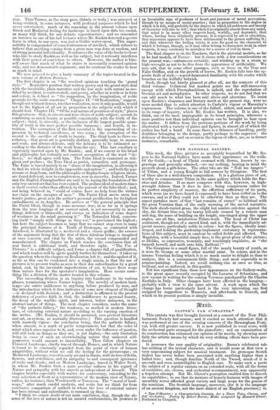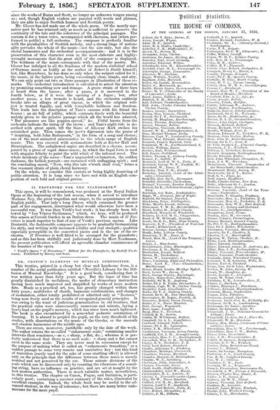111 u s ir.
GLOVER'S TAM 01111IANTER.*
This cantata was first brought forward at a concert of the New Phil- harmonic Society last season; and it excited so much attention that it was performed at one of the evening concerts of the Birminglutm Festi- val, with still greater success. It is now published in vocal score, with the orchestral parts arranged for the pianoforte; and an examination of its construction has enhanced our opinion of its merits, by showing more fully the artistic means by which its very striking effects here been pro-
It possesses the rare quality of originality. Burns's celebrated tale has nothing of the lyrical character, and it would seem at first view a very unpromising subject for musical treatment. Its grotesque Scotch dialect has never before been associated with anything higher than a ballad tune; and, though familiar North of the Tweed, much of it is uncouth and even unintelligible to English ears. To make such a poein the subject of a regular cantata on an extended scale, with all the forms of recitative, air, chorus, and orchestral accompaniment, was apparently a hopeless attempt. But Mr. Glover's perception enabled him to discern its capabilities ; to see that its mixture of homely humour with images of unearthly terror afforded great variety and large scope for the genius of the musician. The Scottish language, moreover, (for it is the language of an ancient kingdom, not the mere dialect of an English province,) • Tam 0.9hanter : a Characteristic Cantata, for a Tenor Voice, Chorus, and fill Orchestra. Poetry by Robert Burns; Music composed by Howard (Bove. Published by Chappell.
since the works of Burns and Scott, no longer an unknown tongue among us; and, though English readers are puzzled with words and phrases, they are able to enjoy Scottish humour and Scottish poetry.
Mr. Glover has not made use of the whole poem. Of the merely nar- rative part he has retained only as much as is sufficient to preserve the continuity of the tale and the coherence of the principal passages. The cantata is for a tenor -voice, accompimiedwith choruses, and (when per- formed in public) a full orchestra. The composer is perfectly familiar with the peculiarities of Scottish melody, and a strong tinge of nation- ality pervades the whole of the music—not the airs only, but also the choral harmonies and the orchestral accompaniments : and it is in the preservation of this character even in the most elaborate and highly- wrought movements that the great skill of the composer is displayed. The wildness of the music corresponds with that of the poetry. Mr. Glover has indulged in all the freedoms of the modern diabolical school of German Music as boldly as the author of Robert is Diable himself; but, like Meyerbeer, he has done so only when the subject called for it; the music, in the lighter parts, being exceedingly clear, simple, and airy. We can only point out two or three passages- in illuseration of these re- marks. The orchestral introduction is calculated to arrest the attention by promising something new and strange. A grave strain of three bars is heard from the basses-, after a pause, it is answered in the fourth below, as if it were the opening of a fugue but, after another pause, a low tremolo is heard, and the orchestra suddenly breaks into an allegro of great vigour, in which the original sub- ject is treated fugally, and with remarkable boldness and freedom. This leads into the description of Tam's carouse with his friend the Souter ; an air full of jollity, which contrasts finely with the beautiful melody given to the pensive passage which, all the world has admired, "But pleasures are like poppies spread," Scc. Fitful bursts from the orchestra indicate the rising of the storm ; and Tam's night ride is de- scribed with great spirit, till the blaze of Alloway Kirk strikes his astonished gaze. Then comes the poet's digression into the praise of "inspiring, bold John Barleycorn," in the form of a song and chorus; one of the most animated anaereontics in the whole range of Englis music. This was encored with acclamations both at Exeter Hall and Birmingham, The unhallowed orgies are described in a chorus, accom- panied by a piece of rapid dance-music, which the fugal form is used with singular felicity to paint the wild whirl of the infernal revel. The whole incidents of the scene—Tam's unguarded-exclamation, the sudden darkness, the hellish pursuit—are sustained with unflagging spirit • and the concluding moral, "Now, wha this tale o'truth I. read," forms a fine resonant strain of 'plain choral harmony.
On the whole, we consider this cantata as being highly deserving of public attention. It is long since we have met with an English com- position of such bold and original genius. •











































 Previous page
Previous page